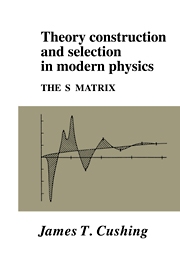Book contents
- Frontmatter
- Contents
- Preface
- Acknowledgments
- 1 Introduction and background
- 2 Origin of the S matrix: Heisenberg's program as a background to dispersion theory
- 3 Dispersion relations
- 4 Another route to a theory based on analytic reaction amplitudes
- 5 The analytic S matrix
- 6 The bootstrap and Regge poles
- 7 An autonomous S-matrix program
- 8 The duality program
- 9 ‘Data’ for a methodological study
- 10 Methodological lessons
- Appendix
- Notes
- References
- Glossary of technical terms (from physics and from philosophy)
- Some key figures and their positions
- Index
8 - The duality program
Published online by Cambridge University Press: 05 June 2012
- Frontmatter
- Contents
- Preface
- Acknowledgments
- 1 Introduction and background
- 2 Origin of the S matrix: Heisenberg's program as a background to dispersion theory
- 3 Dispersion relations
- 4 Another route to a theory based on analytic reaction amplitudes
- 5 The analytic S matrix
- 6 The bootstrap and Regge poles
- 7 An autonomous S-matrix program
- 8 The duality program
- 9 ‘Data’ for a methodological study
- 10 Methodological lessons
- Appendix
- Notes
- References
- Glossary of technical terms (from physics and from philosophy)
- Some key figures and their positions
- Index
Summary
In this chapter we examine the origins of a program that emerged from the S-matrix formalism but that soon took on a quite independent existence. Its greatest interest for present high-energy physics is that it led to superstring theories. This evolution is also of interest methodologically, as an example of an abandoned research program giving rise to a possibly ‘correct’ theory that might otherwise never have been formulated.
The concept of duality was an outgrowth of the Regge program. The simple Regge-pole form for the scattering amplitude arises from the exchange (in the crossed channel) of a Regge pole and is valid at high energy. When that form is extended (or extrapolated) to low energies, it gives the same result as the average value of an amplitude generated by the exchange of resonances in the direct channel (see the ‘pictoral’ representation of Eq. (8.1) below). More specifically, when sum rules (an example of which we have seen in Eq. (6.31)) that are integrals over differences of total cross sections are evaluated once numerically using experimental data and once ‘theoretically’ using the simple Regge form (at all energies), the results agree. This type of equivalence between direct-channel resonance and crossed-channel Regge exchange became known as duality and was a self-consistency form of the bootstrap. Veneziano offered a specific and simple analytical model that provided a concrete instantiation of the duality conjecture. This example was important both for subsequent theoretical progress and for immediate phenomenological applications.
- Type
- Chapter
- Information
- Theory Construction and Selection in Modern PhysicsThe S Matrix, pp. 189 - 208Publisher: Cambridge University PressPrint publication year: 1990



